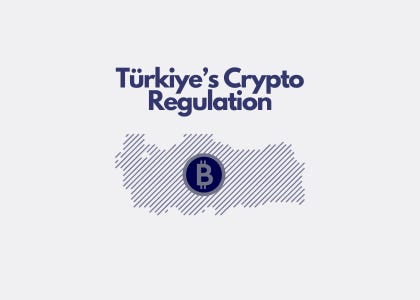Hello everyone,
Here are some local discussions for you. In a recent interview with the Minister of Treasury and Finance, Mehmet Şimşek, some insights were shared regarding the anticipated crypto asset law draft. I had previously mentioned in my CoinDesk articles and my web3 brew newsletter that we were expecting the crypto asset law draft, which has been in the works since 2020, to come into effect in 2024. Both the Medium-Term Program (OVP) and Şimşek's statements seem to confirm this.
Budget Priorities and Global Trust: The Challenges Ahead
Due to budget priorities in the last quarter of 2022 and the 2023 election agenda, efforts on the Data Protection Law (KVKK), Digital Markets Act (DMA), and crypto asset regulations had stalled. During this time, global trust in the crypto industry declined, further contributing to the delay. Major legal cases involving entities like Tether and FTX led to a wait-and-see approach in many countries, with regulators saying, "Let's wait for decisions in the U.S. and regulations in the EU, and we will adapt accordingly." It's no secret that the uncharted risks associated with new technology have made regulators cautious. However, there is hope on the horizon; slowly but surely, legal cases are concluding, regulations are taking shape in the EU, and Türkiye, with its capacity to become a major player in the crypto space, needs to advance its regulatory efforts.
Now, let's delve into Mr. Şimşek's statements:
Aligning Definitions with Global Standards
One of the cornerstones of any regulation is its definitions. Without accurate definitions, it's challenging to create effective regulations. In previous draft works, we had lagged behind globally in terms of definitions. According to Mr. Şimşek, the new draft's definition of crypto assets is similar to that found in the 2021 regulation published by the Central Bank of Türkiye (TCMB), with some differences. Crypto assets will be defined as "intangible assets that represent value or rights." While it's positive that this definition aligns with the EU's MiCA definition of "a digital representation of value or of a right," the classification of crypto assets as intangible assets is maintained. We can see this as a 50% gain, but it still seems out of sync with the global perspective and regulations. The fact that Türkiye has not deviated from the TCMB's perspective highlights our lack of progress on definitions over the past 2.5 years. Considering the expanding nature and use cases of crypto assets, it is crucial to revisit this definition.
The Authority: CMB
The licensing of crypto asset service providers, establishment requirements, and organizational obligations will be based on the existing model for brokerage firms in the primary regulation. Details will be clarified through secondary regulations by the Capital Markets Board (CMB). This is an expected development that will boost confidence among new market entrants. However, globally, there is a trend toward establishing a separate regulatory body for crypto assets. Although there is no nuance in the announcement, previous drafts have indicated that the transition period is crucial for global investments in Türkiye. Shortening the transition period can result in higher costs for technical and operational preparations, potentially leading to the withdrawal of global investments from our country. Another factor that can lead to this outcome is the unequal distribution of obligations between global service providers and local service providers.
Taxation: A Careful Approach
On the taxation front, the absence of any immediate regulation and the indication that it will be addressed separately suggest that this matter will be handled with care, without rushing. The Tax Council has been closely monitoring global examples for three years, conducting a detailed study. At the global level, there is still no consensus on taxation. While ongoing tax discussions that will likely gain more prominence in global summits in 2024 continue, the opinions and case studies of international policymakers such as the OECD, FATF, and IMF are crucial. This approach should continue in Türkiye, as it can help establish a solid foundation for taxing crypto assets.
Listing aligns with the spirit
In the crypto asset ecosystem, one significant aspect of user acquisition is newly listed assets. In this context, not intervening in the listing of crypto assets on exchanges can be considered a positive policy.
FATF’s gray list is one of the concerns
Furthermore, it is mentioned that the regulation will contribute to Türkiye's removal from the FATF's gray list. This will help Türkiye establish a more reliable position in the international financial world.
📢 What are your thoughts on the current state of crypto regulation in Türkiye? Share your views in the comments below!
The Balance of Innovation and Risk
Innovative technology regulations require a delicate balance between risk and innovation. Hopefully, both primary and secondary regulations in our country will be developed with a perspective that encourages innovation. Regulators making restrictive decisions in a new technology and advancing regulations with a risk-focused approach can unfortunately lead to the withdrawal of a developing sector that could contribute to our economy, obstruct investments, and limit new employment opportunities. In this context, as the EU does well, it is essential to involve public stakeholders and consider industry opinions, developing the draft in collaboration with stakeholders.
These statements and plans provide us with many clues about Türkiye's path in the crypto asset space. However, it's essential to always bear in mind that how such regulations shape the market and how faithfully and transparently the rules are implemented are crucial factors. I can comfortably say that for the past five years, as someone closely involved in Türkiye's crypto/blockchain ecosystem, Türkiye has been recognized globally as a talent pool for this field. Seeing liberal and innovation-supporting steps to realize this potential would be encouraging for us all.
✉️ Stay updated on Türkiye's journey in the crypto space. Subscribe to my newsletter for the latest updates and insights.





